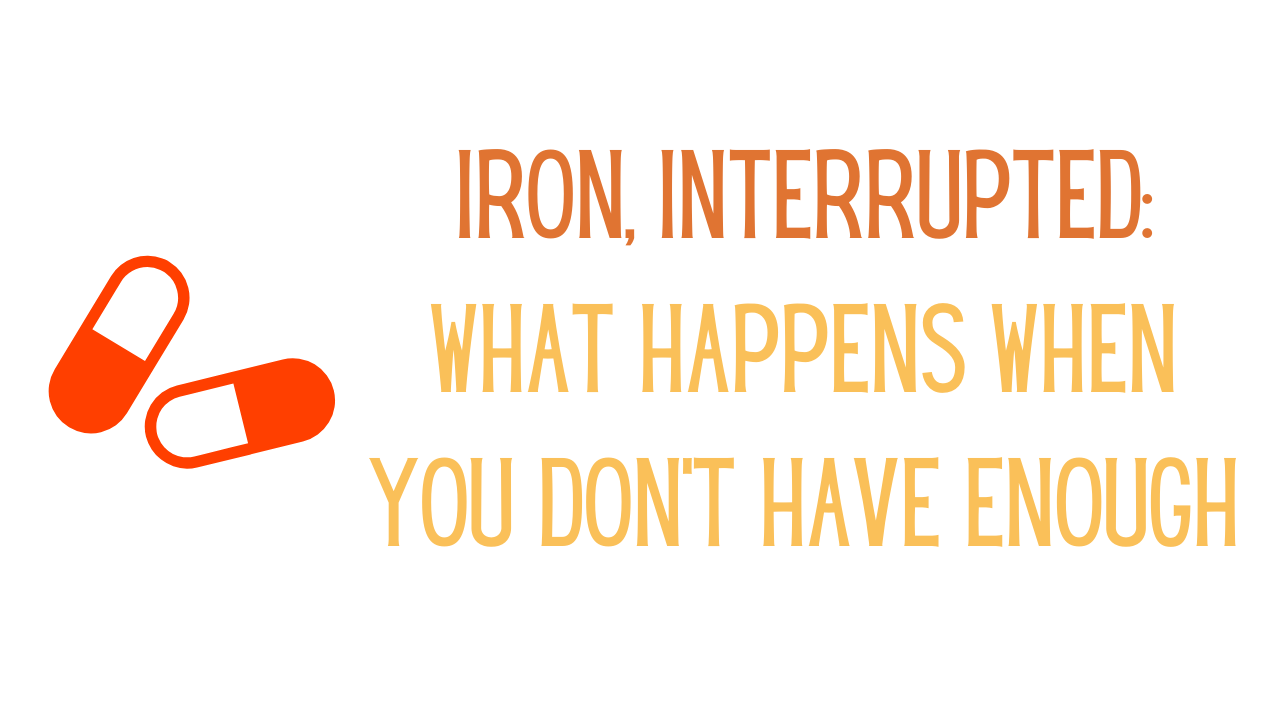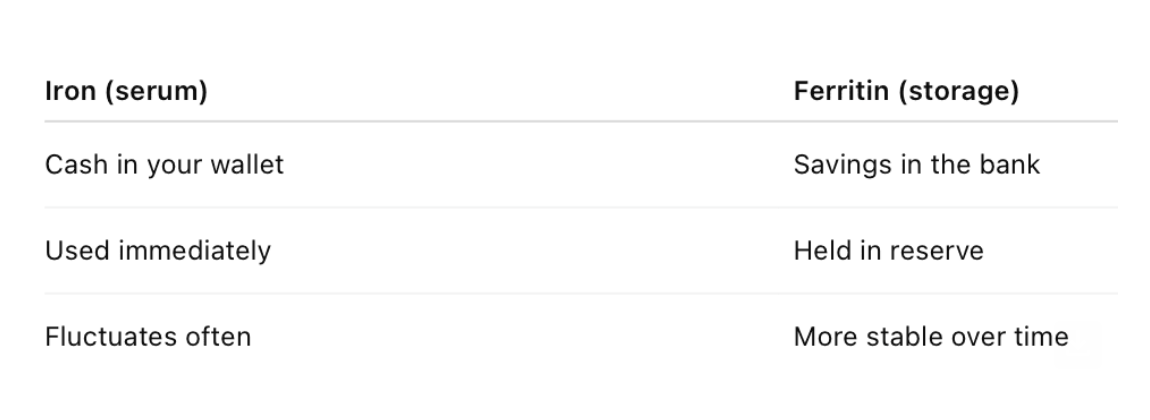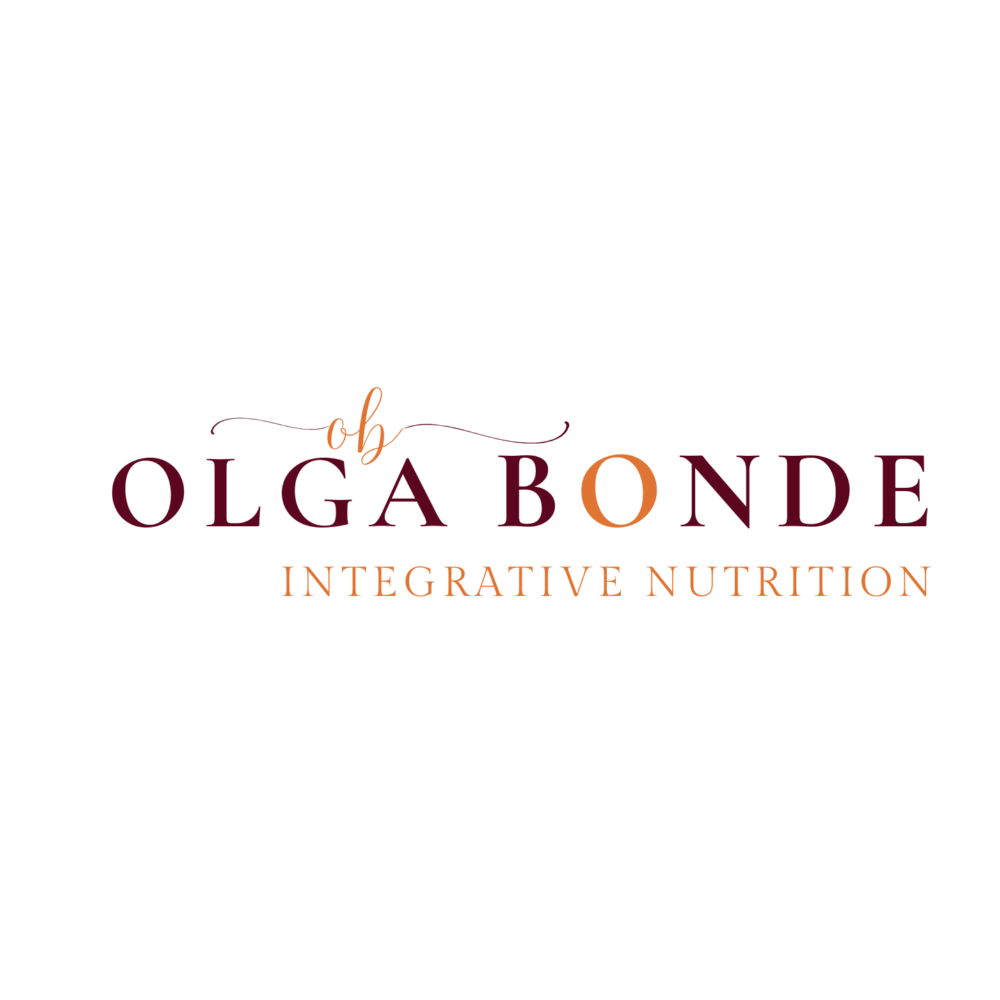🩸 Iron A-Z
Aug 07, 2025
Let’s talk iron and why it matters more than you think.
WHY DO WE NEED IRON?
Iron is a critical mineral with some non-negotiable roles in the body:
🧠 Oxygen Transport: Iron is a key part of haemoglobin - the protein in red blood cells that carries oxygen from your lungs to your tissues(so you can feel full of life).
💪 Energy Production: Your mitochondria (your cells' powerhouses) need iron to function properly.
🛡️ Immune Health: Iron supports your body’s ability to fight infection.
🧠 Cognitive Function: Low iron levels are linked to brain fog, low mood, and poor concentration.
If you're one of those people who always feel tired, weak, get dizzy standing up, or struggle with brittle nails or hair thinning, your iron levels might be a part of the story.
But here's the kicker: many women supplement with iron and still see low ferritin on their blood tests.
So what gives?
Let’s break it down.
But before we do that, I want to explain the difference between iron and ferritin, so you can make better informed decisions when you look at your tests.
When you see "iron" on your blood test it’s not the full story, iron metabolism is more layered than that. Here’s the key distinction:
Iron (serum iron, which is iron in your blood)
This is the actual iron circulating in your blood at the time of the test. It’s what your body is actively using for things like oxygen transport, energy production, immune and brain function.
👉 It can fluctuate daily depending on meals, time of day, or inflammation.
Ferritin
Ferritin is your iron storage protein, a bit like your iron “bank account”. It is stored mostly in the liver, spleen, and bone marrow.
Ferritin is a more stable marker of your long-term iron status.
✅ Ferritin is the best early marker for iron deficiency - you can have normal serum iron but low ferritin and still feel exhausted.
⚠️ But remember: ferritin also rises during inflammation or infection (because the body locks iron away from pathogens so they won’t feed off it), so high ferritin doesn’t always mean you have too much iron, very often it only means inflammatory processes.
So, ideally, to get a better rounded picture of your iron status, you need to understand both. For some people, it is perfectly possible to function really well with lower ferritin and healthy levels of iron, for others it won’t be enough.

Why low iron (especially low ferritin) is common in women 40+
Many women over 40 deal with chronically low ferritin. Despite an iron sufficient diet or even supplementing iron.
There is likely to be more than 1 explanation to it, but here are some ideas for you.
Examples of what is see in my clinic most regularly:
1.POOR ABSORPTION
- Low stomach acid (common with age, stress, PPIs, or hypothyroidism) - if your digestive fire is not strong enough, it becomes incredibly difficult to absorb iron. A real curse of a modern woman and relates to 80-90% of population.
- Your dietary model (eg being plant-based) - lack of animal products in your diet naturally downregulates your digestive fire strength, you produce less enzymes/stomach acid (because plants are easier to digest) - but then it also affects your ability to absorb nutrients like iron. Also, of course, iron that comes from plants is less bioavailable for our body.
- Gut inflammation - iron is mainly absorbed in the small intestine. But when the gut is inflamed from conditions like coeliac disease, IBS/IBD, SIBO, leaky gut, chronic stress or food sensitivities - the delicate lining becomes damaged or less functional. This affects the tiny structures responsible for nutrient uptake.
- Inflammation also triggers hepcidin - the iron blocker. Inflammation (even low-grade) causes your liver to release a hormone called hepcidin. This acts like a gatekeeper: it blocks iron absorption from the gut and prevents iron release from storage (ferritin). Why? Because in times of infection or immune stress, your body hides iron to starve potential pathogens. Smart in the short term - but problematic if you’re dealing with chronic inflammation.
- SIBO (Small Intestinal Bacterial Overgrowth) and candida - bacteria steal your iron, literally.
- Gastric bypass or chronic antacid use (again, to do with suppressed stomach cid production, leading to suppressed absorption)
I want to give some extra air space to coeliac disease here. An absolute must for testing if you experience severely low levels of iron/ferritinlayered with some digestive issues. Not much digestive discomfort? Don’t be fooled by that, being coeliac does not necessarily mean having awful cramps and other digestive symptoms, lots of coeliac symptoms can be very silent.
One amusing bit of statistics for you, for 1 diagnosed coeliac patient, we have 7-8 walking around undiagnosed. They just think their stomach is funny at times, yet they feel gravely tired and the hair is thinning by the day. You draw your own conclusions here, Donna. But don’t disregard the possibility, okay?
2. INFLAMMATION OR INFECTION
Ferritin is an acute-phase reactant - it rises during inflammation. But paradoxically, in chronic inflammation, the body can lock iron away in storage and not release it to the blood - this is called functional iron deficiency.
Common in:
- Autoimmunity
- Chronic infections (H.Pylori being one of the worst offenders here, get tested)
- High stress (cortisol can interfere too)
3. INCREASED LOSSES OR NEEDS
- Heavy menstrual bleeding or perimenopause flooding
- Frequent blood donation
- Endurance exercise (big one!)
4. NOT THE RIGHT FORM OR PAIRING
Ever been to a doctor who prescribed you ferrous sulphate? Which delivered nothing but severe constipation and marginal progress to your ferritin levels. Only because ferrous sulphate is one of the least bioavailable forms of iron, your body cannot even absorb it properly.
Iron is generally tricky to absorb and competes with other minerals. You need:
- Vitamin C rich diet to boost uptake
- Avoid pairing iron with calcium, tea, coffee, or high-phytate foods (grains, legumes, seeds and nuts - all the great stuff, right?)
- Choose haeme iron (from meat) or well-absorbed forms like ferrous bisglycinate if supplementing
And here is my little secret for you.
🩸 THE HEPCIDIN EFFECT
Iron absorption is tightly regulated by a hormone called hepcidin, which is released by the liver.
- When you take an iron supplement, hepcidin levels rise within a few hours
- Hepcidin blocks further iron absorption for the next 24–48 hours
- If you take iron again the next day, hepcidin is still elevated, so your body absorbs less
By waiting 48 hours, you allow hepcidin levels to fall - and absorption improves with the next dose, you get the most out of your supplementation.
So, with all the above in mind, here is what you can do:
- Test smart: Ask for the full iron panel (ferritin, serum iron, TIBC, and transferrin saturation, not just hemoglobin). Ideally, test your thyroid too. An experienced clinician will be able to connect all the dots on the test for you.
- Support your digestion - digestive enzymes, bitters, apple cider vinegar, mindful eating - anything that optimises stomach acid production.
- Address the gut: without a healthy digestive system, you won’t absorb iron efficiently. If you know to have dysbiosis/candida/infections/
H.Pylori/leaky gut, as well as multiple food intolerances - these need to be addressed and resolved, so you can start absorbing iron properly. - Reduce hidden inflammation: think gut health, blood sugar balance, thyroid support
- Tailor supplements: Not all iron supplements are created equal, and not everyone needs the same form or dose. Various forms of gentle iron (eg Solgar, Cytoplan, Higher Nature) are a good place to start.
In fact, any of the above is a good place to start.
A friendly reminder, all information in this email is not a medical advice and serves awareness and education purpose only, please always speak to your doctor first.
To your radiant health,
Olga
If you’re ready for thoughtful guidance through the complexity of your health, I offer clear, grounded support shaped by clinical experience and genuine care.
Let's stay in touch!
According to many of my subscribers, Spoonful Of Health is the only newsletter they read in full and are really looking forward to. Because it is actually not a newsletter, but rather me taking you on a journey of female wellbeing in every form it takes.
PS: I don't spam, sign up with confidence.

